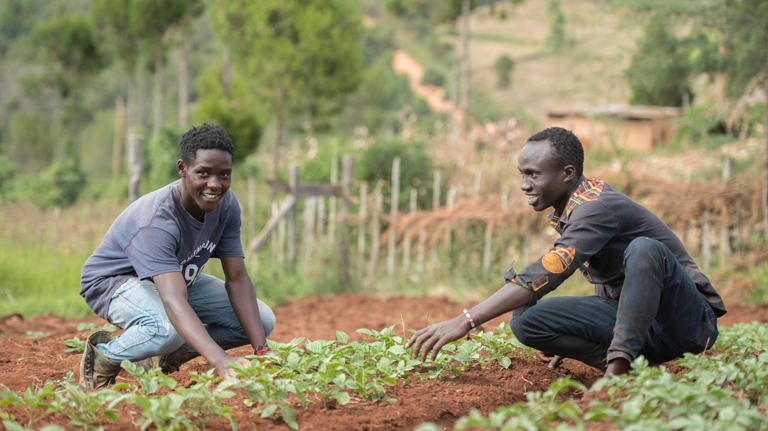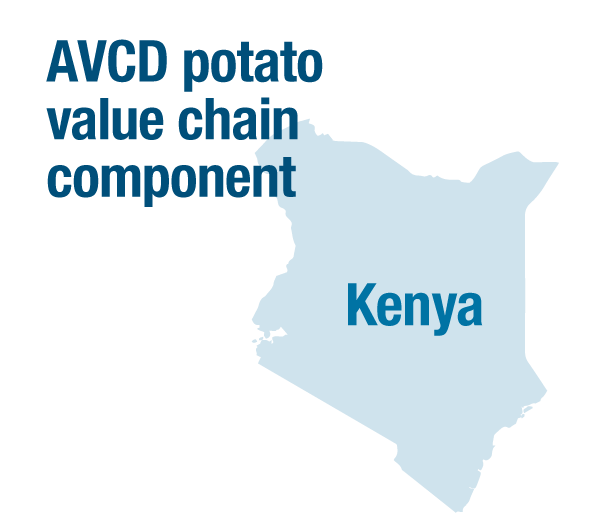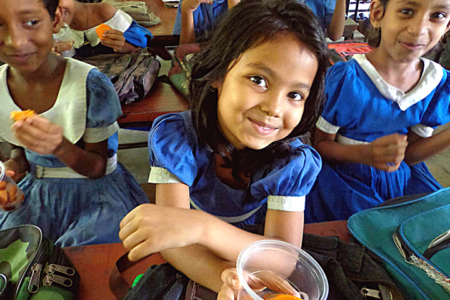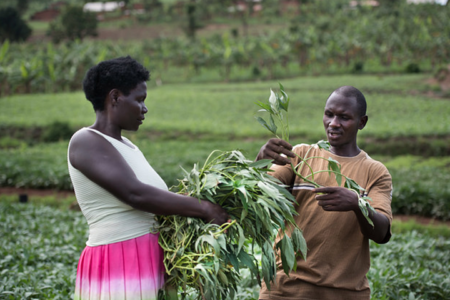
Feed the Future: Accelerated Value Chain Development program—phase II —Potato value chain component.
Agriculture continues to dominate Kenya’s economy, accounting for one third of GDP and employing 75% of the rural population. Maintaining growth and accelerating development in this important sector will require large scale adoption of productivity-enhancing technologies and innovations. This project supports increased food and nutrition security and higher incomes for everyone involved in specific agricultural value chains, making a significant contribution to more inclusive economic development.
Background
Attaining inclusive growth of the agriculture sector in Kenya, and thereby supporting the country’s economic development, depends on boosting food security, building resilience among people and the environment, managing ecosystems sustainably, adapting to climate change, and strengthening private sector participation and investment.
The United States Agency for International Development funded Feed the Future initiative, in partnership with the government of Kenya, aims to reduce hunger, malnutrition and poverty in target geographical areas (known as ‘zones of influence’). This is achieved by promoting sustainable increases in agricultural productivity and nutrition-sensitive production, while building inclusive and competitive market systems. As part of this initiative, the Accelerated Value Chain Development (AVCD) program is being implemented by a consortium of international research institutions, including the International Potato Center (CIP). AVCD focuses on priority value chains, namely livestock, dairy and staple foods, such as potato.
Phase I of the potato value chain component of AVCD supported approximately 47,000 farming households with new technologies, allowing them to improve their productivity and market engagement. To improve the supply of quality seed potatoes, 150 model farmers received support to develop seed multiplier businesses. Farmers gained access to new varieties and learned about practical productivity-enhancing technologies through season-long training on small farms supervised by county extension staff. These interventions resulted in two seed businesses launching production of certified seed potato and several seed multipliers producing quality seed with a business plan to progress towards certified seed. The project also supported local government offices in helping farmers establish potato cooperative marketing groups.
AVCD phase II objectives
Enhance inclusive and sustainable agriculture-led economic growth through:
- The widescale adoption of technologies and innovations—successfully adopted in the zones of influence during phase I of AVCD—in other Kenyan counties where potato is a less important crop; and
- Enhanced self-reliance of county-level government institutions, farmer organizations and the private sector.
Approach
To support national priorities, all AVCD activities are aligned with the government of Kenya’s agricultural development strategy. The intervention takes a whole value chain approach addressing the supply and demand sides of market development. The supply side relates to increasing productivity through improving knowledge and technologies, supporting potato farming as a business, and boosting nutrition. To stimulate demand, AVCD works to improve market links and marketing systems, strengthen farmer marketing groups, and promote government investment to sustain and
evolve interventions.
Gender mainstreaming plays an important role, promoting equality in decision-making and control over resources. Due to their roles in determining household diets, women are specifically targeted with public awareness messages on nutrition. To build resilience to shocks and stresses, including climate change, AVCD encourages sustainable agricultural practices. While gender and youth empowerment and employment are promoted to enhance inclusive business development.
Expected outcomes
The potato value chain component of AVCD phase II is expected to reach approximately 20,000 individuals and put 3,000 ha of land under improved management practices. Activities should generate around USD 4 million in value, with additional investment from the public and private sectors. By promoting nutrition messages, the initiative aims to improve the diets of 2,000 children under two and engage 40% of women in the target districts in nutrition-sensitive agriculture.
This value chain component will continue to promote potato as a cash crop that significantly contributes to food security in Kenya. Building on the success of phase I, the initiative is developing seed systems in additional districts and building the capacities of small-scale farmers to increase their yields and establish marketing cooperatives. The potato component of AVCD also promotes the involvement of women and young people in marketing groups and cooperatives to build empowerment and create new employment opportunities. Additional activities help local government offices become selfreliant in supporting value chain development
| Outcomes | Phase I | Phase II |
| Individuals adopting improved management practices | 47,000 | 20,000 |
| Hectares of land under improved management | 13,300 | 3,000 |
| Value of annual sales from farms and agri-businesses | USD 20.3 million | USD 4 million |
| N°. of children < 2 years with improved nutrition | 1,400 | 2,000 |
Contact
Monica Parker
CIP, Kenya
m.parker@cgiar.org
Thanks to our donors






